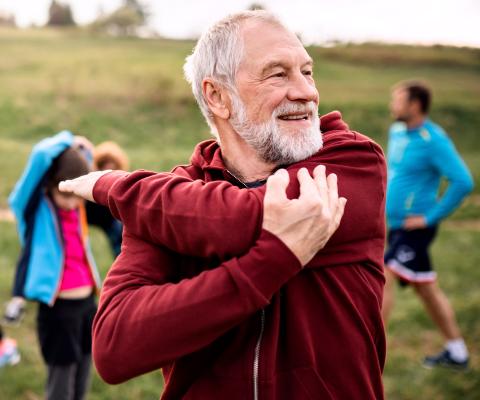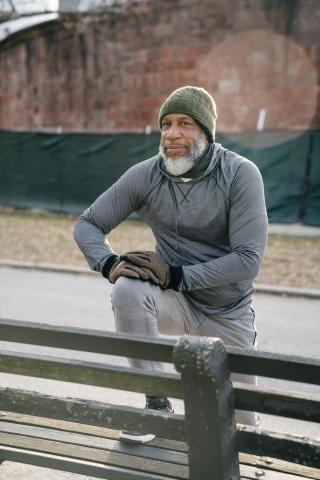Exercise and Moods: why it’s not just a workout but as necessary as food to live.
For years I have lived with a diagnosed mental illness. Before that, I’ve always had a deficit of energy. I learned early on in primary school to conserve my energy. While other children were playing at recess, jumping rope, playing baseball (Island style), or whatever general revelry young ones were up to, I would sit and watch them.
School breaks found me moving around like the others, through the woods, down the road, to the river, and reveling in the speed and enthusiasm of youth. In my late teens, I discovered the joy of before dawn walks in covering a few miles before others were on the road. My college years in the city were all about studying and turning in written and design assignments. At the School of Art, a few of us joined a gym to blow off steam, but it wasn’t consistent.
Not until I emigrated to the United States, did I find the need — with its confining spaces of apartments — to buy exercise equipment. I used it throughout graduate school, work, and more graduate studies. Then came my mental illness diagnosis and many visits to hospitals, doctors, and clinics. After this, exercise was long gone from my vocabulary. However, I was determined to reclaim my life.
Finally! A reason I should make exercise a part of my daily routine. To save my brain!

In a cycle of sharing my mental health journey, challenges, and recovery, I take classes learning about good mental health. I now share what I learned about the benefits of exercise to heal your brain and support optimal mental health.
- Exercise helps to remove toxins1 which can lead to inflammation.2 Research shows that inflammation is one of the markers and contributors of depression.
- Building the muscles of the body helps in building a better brain. Our brain benefits from the increased blood flow to the brain,3 which helps ward off the onset of brain dysfunctions.
- The release of chemicals such as endorphins,4 dopamine, and serotonin5 (low serotonin levels are linked to depression) helps keep us going. Dopamine demands that you keep producing it, which helps keep you on track in your exercise routine. After years of being sedentary, just sitting at computers where most of my work is done, the age spread, and neglect began to show. Physical activity can reverse the metabolic damage of inattentiveness to diet and exercise.
- Exercise can ward off the cognitive fog.6 According to WebMD, "'Brain fog' isn’t a medical condition. It’s a term used for certain symptoms that can affect your ability to think. You may feel confused or disorganized or find it hard to focus or put your thoughts into words.”7
- Exercise is our duty to God to maintain physical wellness. Not only was Elijah a prophet who was prone to depression and low energy, but when the need for physicality arose, he stood up to the challenge. He raced 20 miles before Ahab’s chariot to guide him back home after the spectacle on Mount Carmel (see 1 Kings chapters 17 to 19). Coupling our physical activities with nutritious eating habits and getting adequate sleep are essential in recovery and supporting good brain health.
Call to Action
Maintaining good mental health requires us to return to God the body temple (see 1 Corinthians 6:19) He has given us in best condition. Too often, we neglect the mind through neglect of the body. How can we guard our minds against deception in the last days if we do not keep it in optimal condition?
I’ve started to incorporate exercise into my daily routine. Twenty minutes of walking (aerobics) and a few strength training sets with adequate weights. How much is right for you? Check with your doctor. Let’s get moving to protect our minds!

- https://www.health.harvard.edu/staying-healthy/what-is-inflammation-and-why-is-it-dangerous
- Jones, Brett D M et al. “Inflammation as a treatment target in mood disorders: review.” BJPsych open vol. 6,4 e60. 5 Jun. 2020, doi:10.1192/bjo.2020.43
- Petzinger, G M et al. “The Effects of Exercise on Dopamine Neurotransmission in Parkinson's Disease: Targeting Neuroplasticity to Modulate Basal Ganglia Circuitry.” Brain plasticity (Amsterdam, Netherlands) vol. 1,1 (2015): 29-39. doi:10.3233/bpl-150021
- Harber, V J, and J R Sutton. “Endorphins and exercise.” Sports medicine (Auckland, N.Z.) vol. 1,2 (1984): 154-71. doi:10.2165/00007256-198401020-00004
- Young, Simon N. “How to increase serotonin in the human brain without drugs.” Journal of psychiatry & neuroscience : JPN vol. 32,6 (2007): 394-9.
- https://www.health.harvard.edu/mind-and-mood/protecting-against-cognitive-decline
- https://www.webmd.com/brain/ss/slideshow-brain-fog




